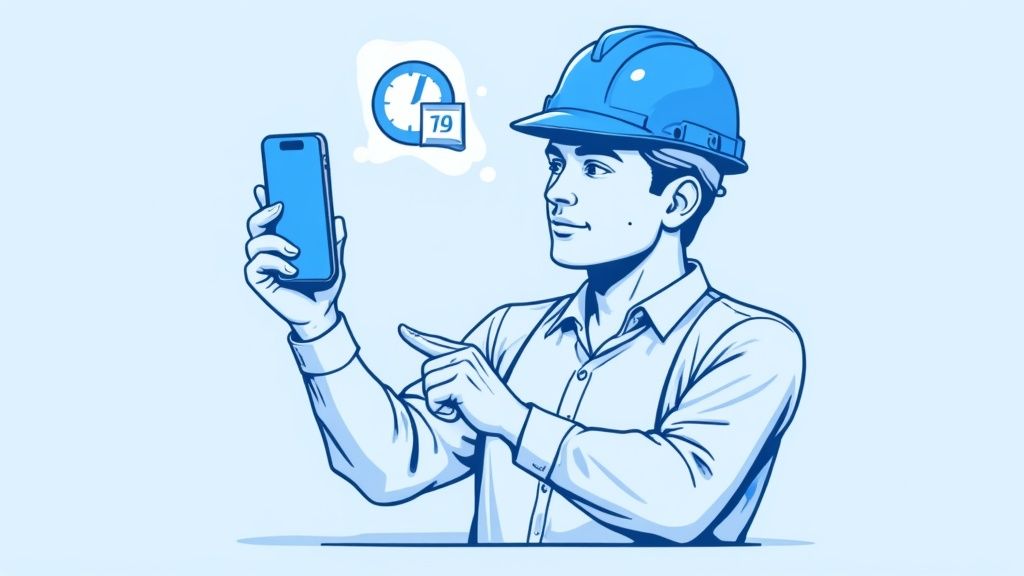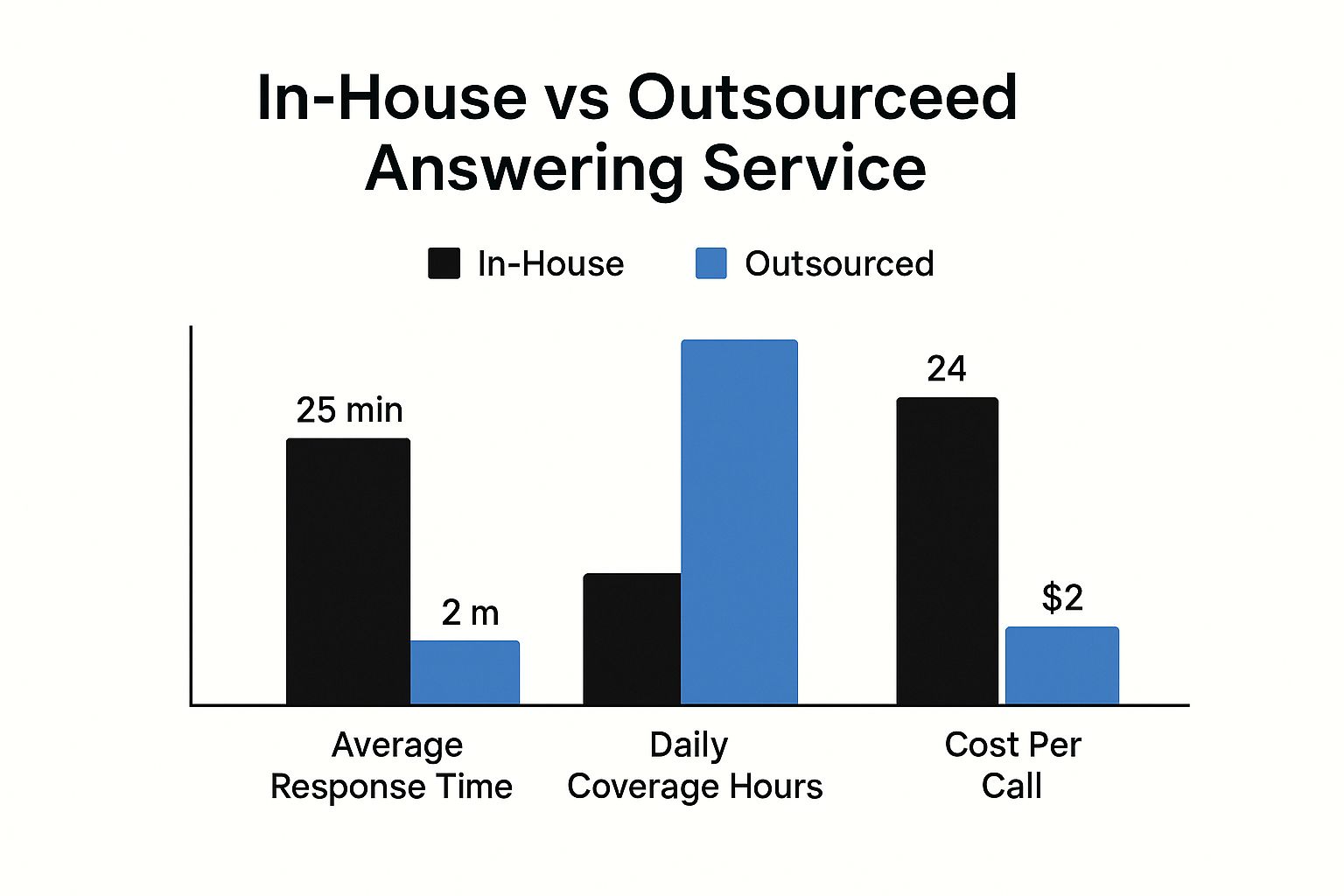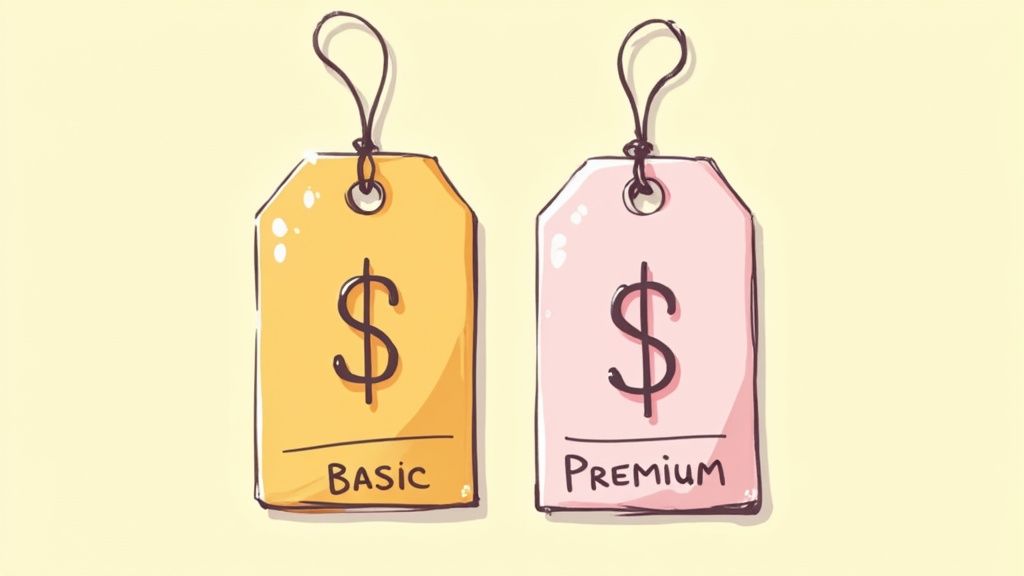Why Smart Contractors Are Ditching Phone Tag

A contractor's workday rarely fits into a neat 9-to-5 box. When you're on a job site, running equipment, or walking a client through a project, the office phone might as well be on another planet.
This disconnect between your work and your communications hub creates a serious business problem. The daily juggle of handling new leads, coordinating with suppliers, and answering client questions results in a staggering 27% of potential jobs being lost simply because the call wasn't answered. Making matters worse, 67% of callers won't leave a message—they just hang up and dial the next contractor on their list. More data on these communication hurdles can be found here.
The True Cost of a Missed Call
Losing a new lead has an obvious financial sting, but the ripple effects of an unanswered phone create deeper, more persistent problems. Every call that goes to voicemail can slowly chip away at a client's confidence in your operation.
Think of a homeowner calling for a quick update on their kitchen remodel. If they hit your voicemail for the third time, they might start to question your organization and reliability. The situation is even more critical for trade specialists. An emergency plumbing or HVAC call won't wait for a callback; that high-value job is immediately lost to a competitor who answers.
This communication gap extends beyond new customers. A missed call from a supplier about a materials delay or a subcontractor trying to align schedules can derail an entire project timeline. The result is costly delays, frustrated clients, and a damaged reputation, all originating from a failure to connect.
Moving Beyond the Voicemail Black Hole
Relying on voicemail and playing endless phone tag is no longer a viable way to run a business. It’s a passive approach that allows chance to dictate your revenue and project flow. Smart contractors recognize that controlling their communication is as vital as managing their budget or equipment.
This requires a shift in mindset: treat every incoming call not as an interruption, but as a critical business event. Whether it's a potential client with a six-figure commercial build or a past customer with an urgent warranty question, prompt and professional engagement is fundamental to growth.
The solution is to put a system in place that is built for this exact challenge. An answering service for contractors acts as a dedicated communications front line, ensuring every call is handled professionally and every opportunity is secured. It transforms your phone from a source of stress into a reliable business development tool.
Human vs Robot: The Real Difference Behind The Hype
Deciding between a human operator and an AI answering service isn't about which is "better." It's about picking the right tool for the right job. One offers emotional intelligence and flexible problem-solving, while the other provides perfect, round-the-clock precision. For a contractor, a single phone call can represent anything from a small repair job to a major construction project, making this choice critical.
To make the right call, you have to look beyond the sales pitch and see how each system actually performs when a customer needs you. Before diving into the human vs. AI debate, it's worth noting why outsourcing your calls—to either service—is a smart move compared to relying on an in-house receptionist or voicemail.

The bottom line is simple: outsourcing gives you 24/7 coverage and significantly cuts down both response times and the cost associated with each call.
When Human Empathy Outperforms Automation
A human agent truly proves their worth during complex or emotionally charged situations. Picture a homeowner calling you, frantic because a pipe burst and ruined the new floors you just installed. They aren't just reporting an issue; they're stressed, upset, and looking for reassurance.
In this moment, a real person can offer genuine empathy, calm the situation, and make a judgment call that isn't in a script. This emotional intelligence—the ability to understand tone, handle ambiguity, and think on their feet—is something an AI simply can't replicate yet.
Where AI Precision Delivers Unbeatable Value
On the other hand, an AI service excels when speed and perfect accuracy are the top priorities. Think about a call for an emergency lockout at 2 AM. An AI answers on the first ring, collects the address and contact information without any errors, and can even process a deposit immediately.
There is no risk of a tired operator mishearing a street name or forgetting to ask a key question. This absolute precision, available 24/7/365, makes an AI-powered answering service for contractors an incredible tool for capturing urgent leads you would otherwise miss. If you want to dig deeper into how these systems work, our guide explaining what an answering service is provides more detail.
To see how these differences play out, the following table offers a real-world comparison of how traditional human operators and AI systems handle the calls contractors actually receive.
Human vs AI: What Really Happens When Your Phone Rings
| Call Scenario | Human Service Response | AI Service Response | Best Choice |
|---|---|---|---|
| Emergency Water Damage (3 AM) | Answers after a few rings; may sound tired. Reliably takes message and follows dispatch protocol. | Answers instantly. Captures all details perfectly and can trigger automated dispatch notifications. | AI |
| Complex Scheduling Request | Navigates a complicated calendar and client preferences but may require back-and-forth. | Books simple appointments instantly but may struggle with multi-part requests or exceptions. | Human |
| Upset Client Complaint | Offers empathy and de-escalation. Can make nuanced judgments to calm the caller. | Follows a script for complaints. May sound impersonal, potentially frustrating the caller more. | Human |
| Routine Quote Request | Politely gathers information and forwards it to the sales team for follow up. | Gathers information with 100% accuracy via a structured script and can text the user a link. | AI |
The pattern is clear: AI is the better choice for standardized, urgent tasks where data accuracy is everything. Humans remain essential for calls that require empathy, complex problem-solving, or navigating situations that don't fit a neat script.
The Money Talk: What You're Really Paying For

When looking at an answering service for contractors, the monthly bill is usually the first number that gets all the attention. A $300 monthly fee can feel like another line item you don't need. But this view changes when you compare it not just to hiring someone, but to the actual cost of doing nothing.
The True Cost of an In-House Receptionist
Hiring a full-time receptionist seems like the most direct solution for handling calls, but the financial commitment goes far beyond the hourly wage. The sticker price of a salary is just the start. You're also paying for payroll taxes, health insurance, retirement plans, paid vacation, and sick leave. On top of that, there are costs for equipment, training, and the physical space for them to work.
An answering service provides a critical communication channel without this heavy overhead. A full-time receptionist will cost you between $35,000 and $45,000 annually, and that’s before benefits. In contrast, a solid answering service plan typically costs between $200 and $500 per month. This represents a massive 80-90% reduction in direct staffing expenses for handling your calls. This comparison shows a clearer picture of the financial commitment, turning a major liability into a predictable operational cost.
The Hidden Drain: Calculating Missed Opportunity Costs
The biggest expense in your business often doesn't appear on any invoice. It's the revenue you lose every time a potential customer's call goes to voicemail. For a plumber, one missed call could be a $15,000 bathroom remodel project. For a general contractor, that same missed call might be a $200,000 commercial project that goes straight to a competitor who simply picked up the phone.
These aren't just abstract figures; they are the real-world consequences of communication gaps. Calculating this opportunity cost is fundamental. If an answering service captures just one of these high-value jobs that you would have otherwise missed, it has likely paid for itself for the entire year.
Financial Breakdown: Service vs. Staff vs. Inaction
To put these options into perspective, it helps to see a direct financial comparison. The table below details the real costs and returns associated with each approach to handling your phone calls.
Real Cost Breakdown: Service vs Staff vs Missed Opportunities
Complete financial analysis comparing answering service costs with in-house staff expenses and the hidden cost of missed calls
| Cost Element | In-House Staff | Answering Service | Missed Call Impact |
|---|---|---|---|
| Monthly Cost | $3,500+ (incl. benefits) | $200 – $500 | $0 (but high revenue loss) |
| Coverage | 8-10 Hours/Day, 5 Days/Week | 24/7/365 | Sporadic & Unreliable |
| ROI | Negative (Cost Center) | Positive (Revenue Protection) | Highly Negative (Lost Jobs) |
The numbers make it clear: inaction is the most expensive choice by a wide margin. While hiring a receptionist provides coverage, the high cost and limited hours often make it an inefficient use of resources. The answering service for contractors offers the most financially sound path, balancing a minimal monthly cost with maximum coverage and opportunity capture. And this model becomes even more compelling with newer systems, which you can learn about in our guide on the modern AI phone answering service.
Ultimately, the question isn't whether you can afford an answering service, but whether you can afford to keep losing valuable business without one.
Why Everyone's Talking About Contractor Communication
For a long time in the contracting world, being reachable 24/7 was a point of pride. The owner-operator who answered every call personally was seen as dedicated. But that mindset is changing. Business owners now see this “always-on” approach for what it is: a major operational bottleneck that hurts growth.
Instead of just reacting to calls, successful contractors are building proactive communication systems. This isn't a small adjustment; it's a significant industry-wide move. The numbers back this up. The answering services market is projected to reach $8.4 billion by 2025, with contractors being a primary force behind that growth.
Contractors now account for 21% of all businesses using these outsourced services. Within that group, 31% focus on building equipment, showing how crucial organized communication is for managing jobs and machinery. You can explore more insights from this market data here. The data is clear: investing in an answering service for contractors is becoming a standard business practice.
The End of the "Always-On" Owner
The owner-as-receptionist model simply doesn't scale. It might work when you're a one-person crew, but as your business grows, the cracks start to show. This approach inevitably leads to major problems.
First, it causes owner burnout. Trying to juggle sales calls, client updates, and subcontractor coordination while you're on-site doing the actual work is a recipe for exhaustion and costly mistakes.
It also projects an unprofessional image. Answering the phone while out of breath on a noisy job site doesn't inspire confidence. Neither does letting calls go to a voicemail box that's always full. High-value clients notice these signs of disorganization.
Ultimately, it creates a growth ceiling. You cannot be on a ladder and closing a new deal at the same time. When the business owner is the only person who can answer the phone, the company’s ability to capture new leads is capped by their personal availability.
How Client Expectations Have Changed the Game
At the same time, your clients have changed. They live in an on-demand world where they can get a car, a meal, or a movie instantly. They bring that same expectation of immediate, professional service when they're looking for a contractor for a major renovation.
A 24-hour callback window feels like an eternity to a modern customer. They are much less patient with disorganized phone conversations or playing phone tag for days.
When a potential client calls, they are evaluating your business from that very first interaction. A prompt, professional response from an answering service immediately builds trust and conveys competence. It tells the client that your operation is organized, reliable, and values their time. In a competitive market, this first impression is often the deciding factor between winning a project and being forgotten after a single unanswered call.
Real Contractors, Real Results, Real Talk

Product features on a website are one thing, but the true measure of any tool is how it actually works on the job. To understand what an answering service for contractors can really do, we need to look past the sales pitch and examine the real results from actual businesses.
From Lost Weekend Calls to Captured Revenue
Think of an emergency plumber who makes most of their money on urgent, high-value jobs like burst pipes or sewer backups. Their biggest weakness was after-hours calls. Every call that hit voicemail from Friday evening to Monday morning was a lost job, as a panicked customer would just move to the next name on the list. This meant thousands in lost revenue every single month.
By bringing in a 24/7 answering service, they plugged this leak in their business. Instead of a machine, a live agent or a well-programmed AI would answer immediately, collect the critical information, and dispatch the on-call plumber based on a clear protocol. The outcome was a 40% increase in after-hours jobs in just three months, cementing their reputation as the go-to plumber who always picks up.
Eliminating the Double-Booking Nightmare
Now, consider a renovation specialist juggling several large projects at once. Their phone was a constant interruption. Calls from clients needing updates, subcontractors asking for clarification, and suppliers checking on deliveries never stopped. This stream of calls led to costly mistakes, like double-booked consultations and missed supplier meetings, which damaged client trust and threw timelines off track.
Their solution was an answering service that connected directly with their scheduling software. While these services are great for handling emergencies, their organizational power was the real game-changer for this renovator. By letting the service manage appointments, they cut down on double-bookings and missed meetings by an incredible 78%. This one adjustment not only saved hours of weekly headaches but also made them look far more professional and organized. You can read more about these contractor-focused benefits.
Ending the Subcontractor Phone Tag
Finally, picture a general contractor running a complex commercial project. Their primary bottleneck wasn't acquiring materials or securing permits—it was communication. Trying to coordinate with a dozen different subs over the phone was an exercise in frustration, filled with missed calls and slow replies. A simple question about framing could stall the electricians for a day, triggering a chain reaction of expensive delays.
They implemented an answering service that functioned as a central communications hub. When a subcontractor called, the service followed a specific script to get the necessary details and then instantly sent that information via text and email to the correct project manager. This created a real-time log of every conversation. The phone tag ended, subcontractors responded faster, and the project started moving on schedule, with the added bonus of a documented trail for every single request and approval.
Making It Work With Your Existing Setup
You’ve already put time and money into the software that keeps your business moving—your scheduling app, project management boards, and the CRM your team finally started using. Any new service should lighten your load, not make it heavier. A modern answering service for contractors can’t just take messages; it has to plug directly into how you already operate.
This is the real difference between a simple message-forwarding service and a genuine productivity partner. One service sends you an email with a phone number, adding another item to your to-do list. The other takes that same call and automatically creates a new lead in your CRM, books an estimate on your calendar, and assigns the follow-up to the right person.
This smooth connection happens through secure APIs (Application Programming Interfaces), which act as a translator between your answering service and your other tools. Trustworthy providers make data security a top priority, making sure client details are moved between systems safely. This technical backbone is what makes reliable automation possible.
Key Integrations That Drive Real Value
The main goal is to get rid of manual data entry and shorten the distance between a customer’s first call and a finished job. For contractors, the most useful integrations automate the core parts of the business. You should look for a service that connects with:
- Scheduling Software: The service can view your up-to-the-minute availability and book qualified appointments straight into your calendar. This ends phone tag and stops double-bookings before they happen.
- CRM Systems: Information from new callers—like their name, number, address, and what they need—is automatically used to create a new client profile in systems like Jobber or Housecall Pro.
- Project Management Tools: A call from an existing client about their ongoing project can be logged as a note on the correct task in Trello or Asana. This keeps all communication in one place.
- Invoicing Software: For calls requesting a quote, the service can capture the details needed to create a draft invoice or estimate in a tool like QuickBooks, saving you hours of administrative work.
This level of integration changes the service from a passive message-taker to an active operational assistant. Performing these tasks instantly and without error is what sets a modern system apart. You can explore this concept further in our guide to the next-generation AI receptionist.
Building Your Communication Playbook
Smart integration is more about process than it is about technology. The best outcomes happen when you build a clear "playbook" for the answering service to follow. You set the rules based on who is calling, how urgent it is, and the time of day, effectively turning the service into an extension of your own business logic.
For example, your playbook might state: "If a call is for an emergency water leak, text the on-call plumber immediately and create a Priority 1 ticket in our CRM. If it's a non-urgent request for a bathroom remodel quote, schedule a 30-minute consultation on my calendar for next week and create a new lead." This ensures every call is handled consistently and precisely, just as you would handle it yourself.
Your Decision Framework: Choose What Actually Works
Choosing the right answering service isn't about finding the one with the longest feature list. It's about hiring a communication partner that solves your most expensive problems and helps you land more jobs. This practical approach cuts through the marketing noise, guiding you to a decision that fits your actual business needs.
Start with an Honest Business Assessment
Before you look at any provider, take a hard look at your own operation. The best answering service for contractors is the one that fits the unique rhythm of your business. Start by asking these critical questions:
- What kind of calls are you actually getting? Are they urgent, after-hours emergencies that demand immediate dispatch? Or are they standard quote requests and scheduling inquiries where capturing accurate information is the top priority?
- When do you lose the most opportunities? Is it during the day when you're on a job site and can't pick up? Or is it on nights and weekends when the office is dark? Pinpoint your biggest communication gaps.
- What does a missed call actually cost you? Get specific and assign a dollar value. Is it a $500 repair job or a $50,000 renovation project? Knowing this clarifies the true value of every single answered call.
Answering these questions honestly will give you a clear direction, pointing you toward a human-centric service for complex calls or a precise AI system for speed and 24/7 lead capture.
Key Questions for Potential Providers
Once you know what you need, you can effectively interview potential partners. Don't let a slick sales pitch distract you; get answers to questions that reveal their true capabilities. Answering services represent a growing market, and investing in a professional service is a strategic move to stay responsive. Discover more market insights on this topic.
Ask them point-blank:
- "How customizable are your call scripts and workflows?"
- "Walk me through your exact integration process with [Your CRM/Scheduling App]."
- "What are your uptime guarantees and data security protocols?"
Watch out for red flags like vague, per-call pricing that hides extra fees, a lack of case studies from businesses like yours, or an inability to provide a clear, simple implementation plan. A great partner makes the process easy.
Measuring Success to Ensure ROI
Your work isn't done after you sign the contract. The final step is to track performance to ensure you’re getting a real return on your investment. Success isn’t just a feeling; it’s something you can measure. Keep a close eye on key metrics like:
- The number of after-hours leads captured per week.
- A reduction in appointment-setting errors.
- The hours your team saves on administrative phone tasks.
Ready to put a solution in place that offers clear results from day one? Marlie.ai provides instant, 24/7 call handling with a simple setup and transparent pay-as-you-go pricing. See how our AI phone assistant can capture every job and save you hours each week.

